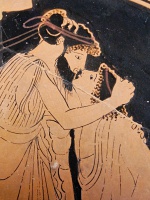Archias of Corinth: Difference between revisions
No edit summary |
No edit summary |
||
| (3 intermediate revisions by 2 users not shown) | |||
| Line 1: | Line 1: | ||
'''Archias''' | '''Archias''' was a semi-legendary personage, the richest man in Corinth and the colonizer of Syracuse in 733 BCE. He left his native city as penance for having caused the death of the boy Actaeon, son of Melissus of Argos, "the loveliest and most modest of all the striplings of his age." Archias fell in love with the boy, who rejected his advances, as he was already the beloved of Aeschyllus of Corinth <ref>Meier, L'amour Grec, 161</ref>. Gathering his servants, he stormed the boy's house. The family and neighbors resisted and in the altercation Actaeon was torn apart. Telephus is another [[eromenos]] of Archias, who, in maturity, captained one of the ships that Archais used to cross to Sicilly and there slew Archias by some subterfuge, to avenge himself for having been taken advantage of when he had been the man's [[paidika]]. <ref>Plutarch, Amatorius </ref> <ref>Diodorus Siculus, Excerpt de virtut. 8.8</ref> | ||
<ref>[https://books.google.com/books?id=nE9RxOP4OE4C&pg=PA59&lpg=PA59&dq=Archias+of+Corinth&source=bl&ots=7c8IpPRhPO&sig=moFIYKr0Z0PpkofkmQHlkPwFQHU&hl=en&sa=X&ei=F7tOVbPnM8G8sQWh04GIBQ&ved=0CC4Q6AEwBjgK#v=onepage&q=Archias%20of%20Corinth&f=false Plutarch, ''Love Stories'' 2.772E - 773B]</ref> | |||
==References== | ==References== | ||
{{Reflist}} | {{Reflist}} | ||
==See also== | |||
*[[Pederastic relationships in classical antiquity]] | |||
{{Navbox Ancient Greece}} | |||
[[Category:Ancient Greece]] | [[Category:Ancient Greece]] | ||
Latest revision as of 22:33, 2 July 2022
Archias was a semi-legendary personage, the richest man in Corinth and the colonizer of Syracuse in 733 BCE. He left his native city as penance for having caused the death of the boy Actaeon, son of Melissus of Argos, "the loveliest and most modest of all the striplings of his age." Archias fell in love with the boy, who rejected his advances, as he was already the beloved of Aeschyllus of Corinth [1]. Gathering his servants, he stormed the boy's house. The family and neighbors resisted and in the altercation Actaeon was torn apart. Telephus is another eromenos of Archias, who, in maturity, captained one of the ships that Archais used to cross to Sicilly and there slew Archias by some subterfuge, to avenge himself for having been taken advantage of when he had been the man's paidika. [2] [3] [4]
References
- ↑ Meier, L'amour Grec, 161
- ↑ Plutarch, Amatorius
- ↑ Diodorus Siculus, Excerpt de virtut. 8.8
- ↑ Plutarch, Love Stories 2.772E - 773B
